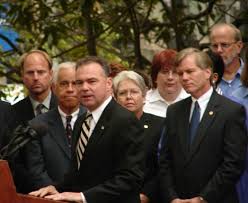 ...he would have written this excellent piece, by Zack Exley (as opposed to this rambling drivel). Here's Exley:
...he would have written this excellent piece, by Zack Exley (as opposed to this rambling drivel). Here's Exley:The Rahm Administration is failing because it believes that the Obama Campaign's big, inspiring message was in fact hippy BS. Unfortunately, most of Rahm's beltway critics agree with him on that score. What the Luce article mainly shows is merely that they are unhappy with the way they've been treated, or that they have some technical issues with the way the White House has been operating.Note that Doug Wilder is one of those "critics" - albeit from a location safely outside the Beltway - who agrees with Rahm that "Obama Campaign's big, inspiring message was in fact hippy BS." Wilder is also, most likely, "unhappy with the way [he's] been treated" (I say this because the egomaniac Wilder is always "unhappy with the way he's been treated"). Again, I'm not in the least bit defending Tim Kaine here, especially insofar as Kaine helps promulgate what I've taken to calling "Tim Kaine Disease" (terminal, rose-colored optimism; arrogance; groupthink; no fixed principles you're willing to fight for; and of course the dreaded Cult of Bipartisanship, even when Republicans outright say that they want you to fail). What I'm saying is that Doug Wilder is wrong in his diagnosis - the charge that Kaine is too liberal is beyond laughable - if not in his cure. In contrast, Zack Exley understands the core problems here:
The fringes of the Progressive movement contain a different kind of critic, a new generation of campaigner-visionaries who believe in the big ideas of the Obama campaign, and who are waiting for a chance to make them real in a future administration. Will Obama reboot his White House to include them? Or will their time come only in 2016, or later? Here's a suggestion: let's keep our fingers crossed about the present, but let's start spending a little more of our time planning explicitly for 2016. That may sound far off and therefore like a cop out, but it's exactly that kind of planning, and nothing less, that put the country in the hands of these "New Democrats."
1. "...the administrations' muddled agenda centers on industry-approved health care reform (which has again been turned out to be an impossible DLC dream), Wall Street bailouts and scattershot stimulus that few Americans are feeling."
2. "Big, clear policies worth fighting for were unthinkable for these particular people, because they see industry and Wall Street as more important than the American people."
3. "...most of them are just trying to be realistic, not malicious: they would prefer to stand up for the American people, but industry and Wall Street are simply more powerful and must be appeased."
Zack Exley is exactly right in this analysis; too little "change," too little populism, too little inspiration, and too little backbone to stand up to corporate interests by the current crop of Obama advisors. In contrast, Doug Wilder - a classic "New Democrat," if he's even a "Democrat" at all at this point - completely fails to understand what's really going on here. Thus, Wilder's critique is more driven by personal pique and pettiness than substantive policy matters. And, to the extent Wilder is driven by policy, he's got it completely backwards. Thus, Wilder incorrectly (and bizarrely) sees Tim Kaine et al. are too liberal (!!!) as opposed to the corporatist hacks and DLC-style "Republican lites" that they truly are (for Kaine, companies like Dominion Power and Bechtel pretty much ruled his administration). Of course, in Wilder's case, it takes one to know one.
UPDATE: Needless to say, I strongly doubt that either Doug Wilder or Tim Kaine would understand the concept of "Prairie Humanism: The (Just Now) Emerging Progressive Movement".
Prairie humanists want to return our political relationships to something like the neighborliness that marks private life across ideological boundaries. Think how much easier it would be to advance environmental initiatives and the greening of industry if we had already been re-framing progressive politics along these lines. Think how different the health care debate would be. The insurance industry argument depends upon an all-against-all worldview.
Prairie humanists drop old, liberal, technocratic talk of managed solutions. We focus upon consequences. How can our neighbors and we best secure health? What are our responsibilities to such a cause?
The unfettered pursuit of private interests obviously dooms collective opportunity and the constitutional guarantees of life, liberty and the pursuit of happiness. We have to contain — and topple — the political and economic authority that enforces this ideological trap. As we’ve seen, humans have been doing just that for a very long time. We can do it, too.

